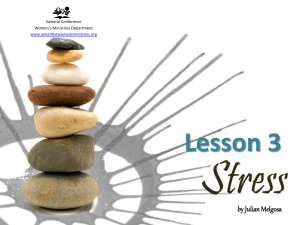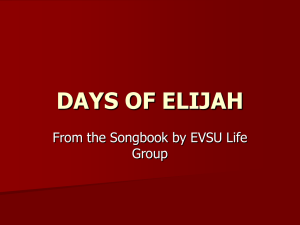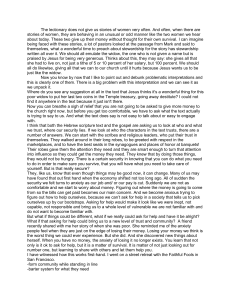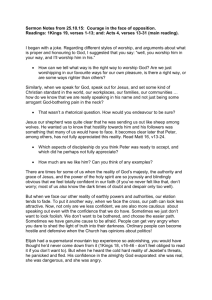10 Sunday in Ordinary Time June 9, 2013 4PM, 10AM, 5:30 PM
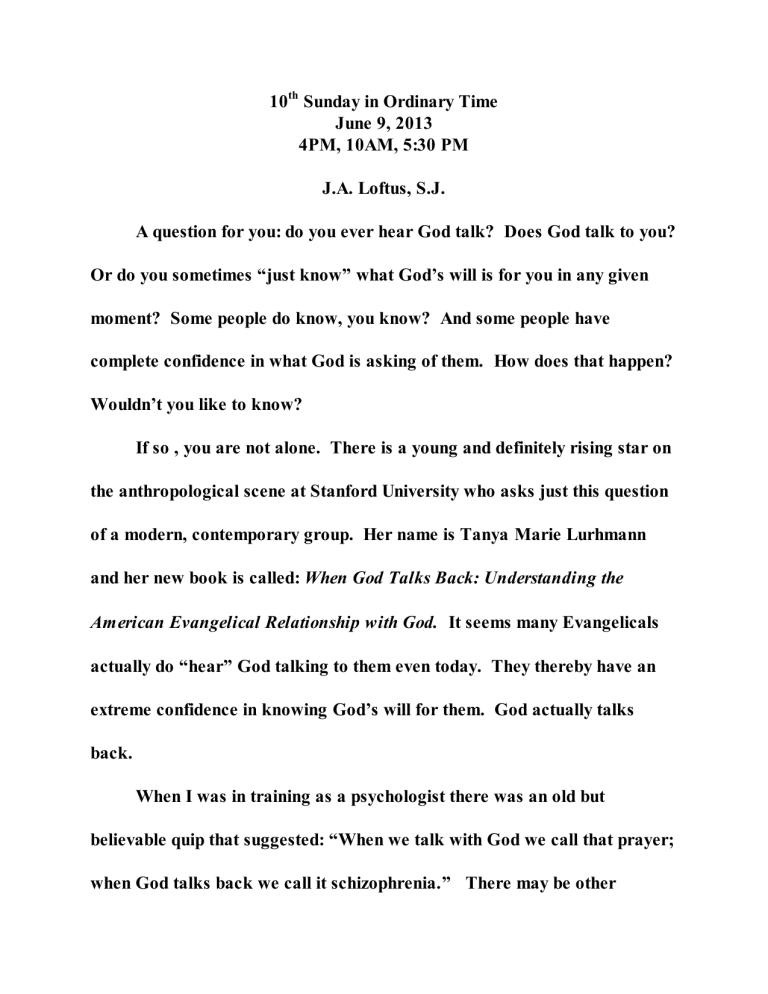
10 th
Sunday in Ordinary Time
June 9, 2013
4PM, 10AM, 5:30 PM
J.A. Loftus, S.J.
A question for you: do you ever hear God talk? Does God talk to you?
Or do you sometimes “just know” what God’s will is for you in any given moment? Some people do know, you know? And some people have complete confidence in what God is asking of them. How does that happen?
Wouldn’t you like to know?
If so , you are not alone. There is a young and definitely rising star on the anthropological scene at Stanford University who asks just this question of a modern, contemporary group. Her name is Tanya Marie Lurhmann and her new book is called: When God Talks Back: Understanding the
American Evangelical Relationship with God.
It seems many Evangelicals actually do “hear” God talking to them even today. They thereby have an extreme confidence in knowing God’s will for them. God actually talks back.
When I was in training as a psychologist there was an old but believable quip that suggested: “When we talk with God we call that prayer; when God talks back we call it schizophrenia.” There may be other
options.
Dr. Lurhmann, who incidentally is becoming so popular that she has been invited to become a “guest columnist” for The New York Times, has spent years visiting and working and praying with Evangelical communities throughout the United States. She says “I will argue that people learn specific ways of attending to their minds and their emotions to find evidence of God, and that both what they attend to and how they attend changes their experience of their minds, and that as a result, they begin to experience a real, external, interacting living presence. In effect, people train the mind in such a way that they experience part of their mind as the presence of God.”
(Sounds pretty Ignatian, don’t you think?)
In short, this learning is about re-learning “to imagine yourself as truly in a relationship with an invisible presence.” This is a learned, cognitive talent, Lurhmann suggests. And she documents her findings with remarkable cognitive science backup.
Could it be that feeling an intense closeness to God, knowing with a special kind of certitude God’s presence and love, is something one can learn to do? Is that what might account for the experiences of Elijah and
2
Paul and especially Jesus in today’s scriptures?
In the first Book of Kings, Elijah visits the widow of Zeraphath just as her son stops breathing. And she says to herself: “And you call yourself a great prophet and man of God!” “You have killed my son.” Elijah immediately takes to prayer and God immediately answers. The son lives.
There is no hesitation here whatsoever. Elijah knows God will hear and answer him instantly. Don’t you ever wonder just how Elijah gained that confidence? How did he know?
Notice something else, though. This “miracle” is not about magic. It’s not even about saving someone from death. The widow’s son will die again sometime. We all do. No, it’s not about a magic saving from death; it is about God’s promise of life and God’s power over life and death that prevails. And the widow proclaims: I know now that the Word of God comes from your mouth and has power.
St. Luke obviously patterns his story to relate another great prophet’s story, in fact “the” Prophet, Jesus. This story takes place in a little town called Nain. Again, there is no hesitation whatsoever. Jesus sees the widow,
“takes pity on her” and raises up her only son. Here too, the story is not
3
about magic. It is about something much bigger and much deeper. Again, it is about God’s saving promise. This son too will die again sometime. We all do. Even Jesus will. But God’s word is real and more powerful that even death. For St. Luke, God will raise Jesus not just from death, but through death itself. And death will be no more, God’s Promise says.
So how did the human, fully human, Jesus know? How does he maintain this confidence in his God even as he cries out later in his life:
“Why have you abandoned me?” But he does maintain his confidence in his
God. So did Elijah. How do they do it? Can this confidence be taught? Is it something one can learn? Could I learn it? Could you? Interesting questions.
Let’s turn for a moment to our third supremely confident prophet, St.
Paul. In his letter to the Galatians, Paul, who is never shy of boasting (his own words), boasts again that he preaches no merely human message but the direct, immediate revelation of God. St. Paul is so confident in hearing
God speak to him that he boasts again that he never even discussed it with
Peter or James or the others in Jerusalem until three years later. As any good Jew might say: that’s real chutzpah.
4
Could it be that these three men, Elijah, Jesus and Paul, actually hear
God speak to them, hear God’s Promise literally? Could it be that the confidence they feel comes from some precondition in their minds and hearts? Maybe their proverbial milk-bottles are already half-full? I don’t know the real answer to this question. But I am not the only one asking it.
It’s a question that still fascinates people. And now it’s even fascinating social scientists.
Don’t get me wrong. I am not exactly “selling” this to you today, as gospel truth. But it is interesting to think about, don’t you think. Even our resident PBS guru Dr. Wayne Dyer preaches it: “If you change the way you look at things, the things you look at change.”
How close do we even imagine God can get to us? Is there something more we can do with ourselves to become more confident in faith? Maybe there is? Maybe we can “prime the pumps” to feel God, to taste God, and, yes, maybe even to hear God. Who knows? Peace!
5

